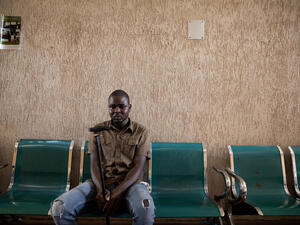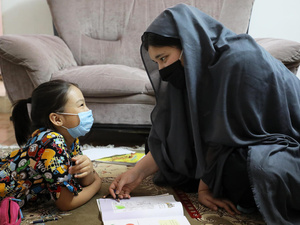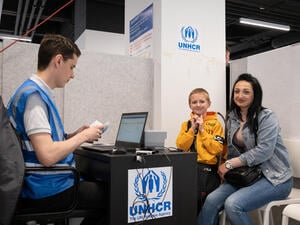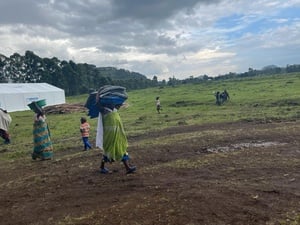Ethiopian asylum seekers and migrants stranded in Somali port city
Ethiopian asylum seekers and migrants stranded in Somali port city

At dawn, Ethiopians on the outskirts of Bossaso, Puntland's busy port, take off through the desert to evade a checkpoint and sneak into town, searching for work or a boat to take them across the Gulf of Aden.
BOSSASO, Somalia, Feb. 17 (UNHCR) - Mired in desperate poverty in Ethiopia, Fatouma Omar's parents borrowed money from friends for a high-stakes gamble and sent their teenage girl on a life-threatening journey they hoped would end in the relative wealth of an illegal job in Saudi Arabia.
Travelling by truck and on foot, risking robbers and sexual harassment along the way, 18-year-old Fatouma and a male friend travelled from their poor corner of Ethiopia to Bossaso, a bustling Somali port city.
Here, her companion used all their remaining money to buy passage to Yemen on a smuggler's boat across the Gulf of Yemen, as do thousands every year. Though his passage only cost about $33, it was much more than they had expected.
"There wasn't enough money for two people," says Fatouma, adjusting her red flowered head scarf. She became terrified when she saw how small and unsafe the boats were, and heard of the many people who drown at sea trying to cross the Gulf of Aden.
"I have no plans to go to Saudi Arabia because the sea is very risky, but now I am afraid to go back to Ethiopia because I borrowed money from people," she says quietly. "My parents think I am in Saudi or dead."
Fatouma's story of even going into debt to fund the hazardous journey is far from unique. She is one of an estimated 3,000 to 6,000 Ethiopians now stranded in Bossaso, unable to go forward or back.
Many who set out for the boats that take refugees and migrants to Yemen (from where economic migrants proceed to their real destination, Saudi Arabia), get robbed or cheated along the way. They then try to find odd jobs in Bossaso's bustling port to try to earn again the money to pay the smugglers.
Others, evidently an increasing number, are fleeing Ethiopia for political reasons fearing persecution. However, once they get to Bossaso, a town of about 200,000 residents, they find they have no chance to apply for refugee status, a procedure that for the moment the UN refugee agency carries out only in Hargeisa, north-west Somalia ("Somaliland").
"Why did these people choose to leave their country and come to a place with no government?" asks Bossaso mayor Khadar Abdi Haji, referring to the absence of a functioning national government in Somalia, of which Puntland is a self-declared autonomous region. The influx of Ethiopians, adds the mayor, is putting pressure on this dusty town which has few civic services.
Local and international aid agencies are stepping in to fill the void. The UN children's agency, UNICEF, is paying a mother and child clinic to seek out Ethiopians who need medical treatment.
The World Food Programme, the Somali Reunification Women's Union, a local non-governmental organization, the Danish Refugee Council and UNHCR have teamed up to provide two meals a day for the "stranded" Ethiopians.
"I'm living only from this feeding programme," says Tadesse Desta, an Ethiopian whose hopes of getting on one of the smugglers' boats were dashed when he was robbed of all his money along the way.
That's not the way it was supposed to turn out. The human smugglers have a smoothly-functioning network that recruits customers in lawless southern Somalia and in Ethiopia with tales of riches or safety abroad, then moves them by bus or by truck along the route to the sea.
"They say the way is very easy to get across to Yemen and Saudi Arabia," says Fatouma Ali, 21, whose innocent young face and demeanour belie the will of steel it must have taken to come this far from home. She ran out of money and has been stuck in Bossaso for six months, unable even to get the money together to return home.
As for her life on the streets of Bossaso, she says, without elaboration: "the women have problems." Some fall into prostitution, reportedly charging as little as 13 U.S. cents for their services.
The International Organization for Migration is now seeking funding to launch a humanitarian repatriation to take back home those Ethiopians who want to go.
But among many others, a sense of fatalism, combined with the desperation of violence, poverty and increasing drought in the Horn of Africa, keeps the people-smugglers in business. Miliyar, a 22-year-old Ethiopian walking along the road south of Bossaso, intent on catching a boat, says in English: "when I am coming from my country, I think two things. I will die or I will get a better life."
If they reach Yemen, Somalis get automatic refugee status as many are fleeing violent conflict, though not all apply for it. Ethiopians are not automatically considered refugees, but can have their cases heard individually. There are currently more than 80,000 registered refugees in Yemen, of whom 75,000 are Somalis. But it is estimated that there are hundreds of thousands more in the country, and many of those who arrive by sea continue north from Yemen to find work elsewhere in the Middle East.
Bossaso and Puntland authorities insist they don't have the manpower or equipment to fight the smugglers. Even locking them up fails to discourage their customers, insists Mayor Khadar.
"If we tell the Ethiopians the boat is 100 kilometres away, they will walk by foot and wait for the people-smugglers to get out of jail," he says.
A complicating element is that a number of the Ethiopians may actually be in need of political asylum in the aftermath of post-election strife last year.
"We need a third hand to take care of them," says divisional police commander Col. Aidid Ahmen Nur. "If we capture all these people and return them back, they may be killed or have political problems. We can't return them home and we can't keep them here."
He insists Puntland would be willing to offer asylum if the international community provided support. "If you help us, we can keep them as refugees," Col. Aidid says. "We can give them peace and keep anyone from harming them."
In fact, "UNHCR is working with the relevant local authorities to initiate refugee status determination in Puntland, so that refugees are not obliged to go to Hargeisa if they don't want to," says Guillermo Bettocchi, UNHCR Representative for Somalia based in Nairobi.
Jemal, a 27-year-old Ethiopian student who says he was active in the Ethiopian opposition and saw many of his friends thrown in prison, fled his homeland on the advice of his father, who is a doctor in Europe. However, he's apprehensive about going to Hargeisa, citing fears there are Ethiopian security agents in the city. All the same, he wants to apply for recognition as a refugee; for now he's one of the thousands stuck in Bossaso.
"All my choices are bad," he says with resignation. "To go back to Ethiopia and be put in prison, or to put myself in danger in the sea and die, or stay here and hope my family will continue to send me money."
"We hope to be in a position soon to help those Ethiopians in Puntland, like Jemal, who say they are fleeing persecution," says Bettocchi.
For now, UNHCR will continue to work closely with local and international humanitarian agencies, as well as the Puntland and Bossaso governments, "to try to meet the most basic humanitarian needs of the migrants and asylum seekers," Bettocchi says, "and to try to end this tragic flow of people."
By Kitty McKinsey in Bossaso, Somalia









